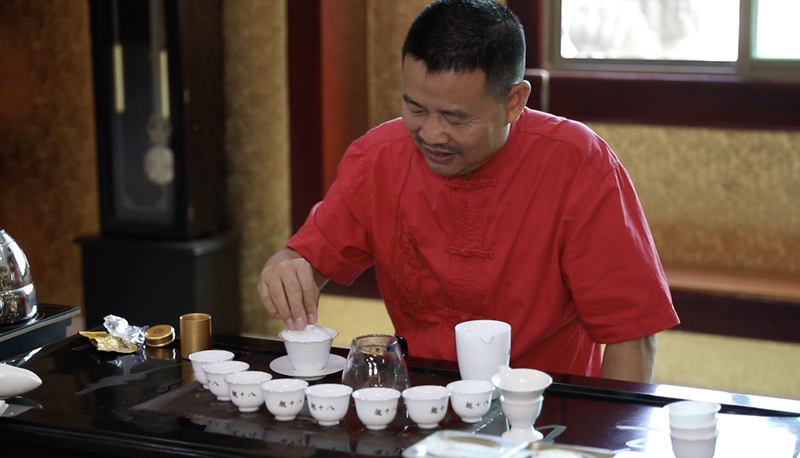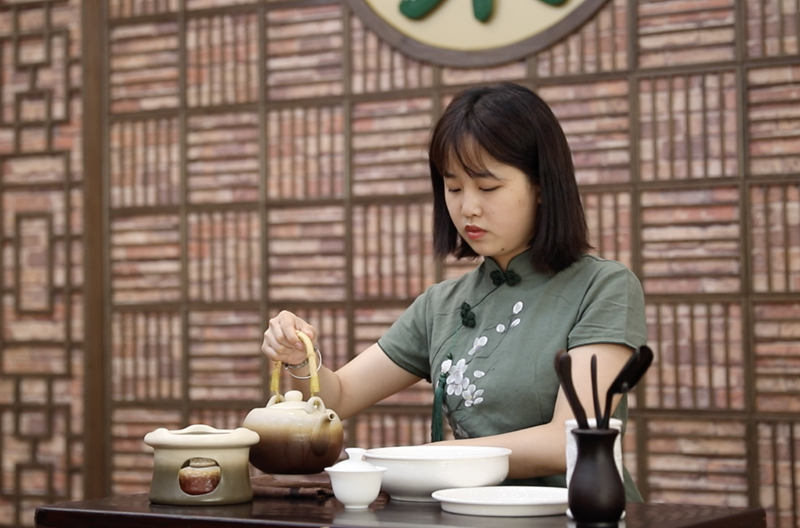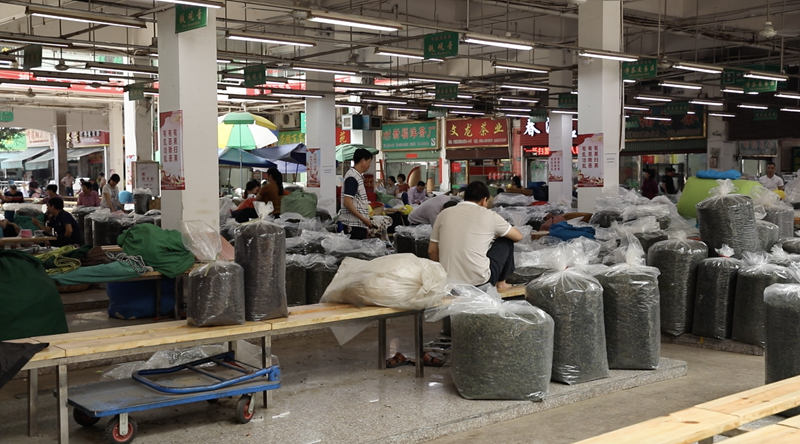

Tieguanyin is a premium variety of Chinese oolong tea which originates and is all grown in Anxi County of southeastern China’s Fujian Province. It holds the title of one of the most expensive teas in the world, with the most costly selling for around 180,000 RMB for 500 grams - so not one I can often afford.

Wei Yuede invites us to take part in a tea ceremony.
Luckily, I'm in Anxi, so it gives me the perfect opportunity to visit Wei Yuede, the owner of Wei Yin Tea. Wei is the 9th generation in his family to work in the industry, so there's no one better to learn from about the tea-making process.
"You are seen as a master if you are good at making Tieguanyin," explains Wei, adding, "Otherwise, you're just a worker."
There are a couple of legends surrounding how Tieguanyin got its name, but Wei assures us that the story of this tea starts with his ancestor, Wei Yin.
He explains that one night in 1723, the God of Mercy (called Guan Yin), came to Wei Yin in a dream and told him she had left a money tree, "It is the best tea tree. I hope you will cultivate it with care and spread it to benefit the people." The next day, he ran to the temple and found, in a nearby cave, a small tea plant unlike any other he had ever seen. He named it Tie Guan Yin, literally the Iron Goddess of Mercy, and planted it, giving cuttings to his fellow farmers to create what is now one of the most famous Chinese teas in the world.

A girl makes tea at the local tea market, Chinese Tea Capital.
The process that goes into making Tieguanyin is long and complex. As Wei explains, "There is a huge difference between skill and industry. The production process is very complicated – that's what makes Tieguanyin so unique. You can literally make any tea once you master the skill of making Tieguanyin."
In short, after harvesting the leaves, they are laid out to release excess moisture. They are then tossed to break down the cell structure of the leaves, which improves oxidation and creates the rich flavor of the tea. It also gives you an idea of what the final drink will taste like, as the whole room fills with the scent of the leaves, which changes from grassy to floral, a thick perfume hanging in the air.
They are then withered while being stirred and roasted in a hot pan, after which point they are rolled by hand or machine to achieve the perfect tiny balls that are typical of the tea, before being dried to stop oxidation and preserve the tea.
After learning how the tea is processed, it's time to try a cup. As someone who is used to the British style of drinking tea, I've always been fascinated by the delicacy of the Chinese tea ceremony. Wei allows us to try his best tea, which costs 3,000 RMB per serving. The reason it's so expensive is that the leaves come from a 300-year-old plant, one of the first Tieguanyin to be planted.
As it brews, which takes only a matter of seconds, the water turns to liquid gold. Wei pours it from a small teacup into even smaller teacups, which would happily fit in the palm of your hand. As someone with no prior experience, even I can tell that this is a beautiful cup of tea. Wei says it will taste creamy, fresh and floral.
Before we get to try, he explains that the first cup is always for Guan Yin, the Goddess of Mercy. He pours the first cup on the tea tray in three elegant movements.
The next cup is for us. It tastes light, floral, and only ever so slightly bitter. I can't taste the creaminess that Wei talks of, but then I am not a connoisseur. However, I can appreciate the way in which this expert talks about his 300-year-old tree and just how exceptional what we are tasting is. It's the most special drink I've ever been allowed to try.

Sellers at the local tea market, Chinese Tea Capital.
After learning from the master, it's time to head back into the local town in search of some more Tieguanyin. I arrive at a local tea market looking for some slightly cheaper tea to take home. En route, I had anticipated a regular Chinese market with a tea section, but I am met with an entire, two-story market dedicated purely to Tieguanyin, named Chinese Tea Capital.
Tea here comes in 500g measurements, known as a jin in Chinese. If you're wondering, that's a lot of tea. A particularly friendly salesman tells me about his Tieguanyin, and after agreeing a price he pulls out a hand shovel to fill up a bag, giving me an extra 200 grams on the house.
It's clear to see the culture surrounding tea here in Anxi county, and Fujian Province in general. Armed with enough tea for a year, I'm leaving with a better sense of why this tea is so important to local people and why it is so famous among tea lovers around the world.

 Award-winning photos show poverty reduction achievements in NE China's Jilin province
Award-winning photos show poverty reduction achievements in NE China's Jilin province People dance to greet advent of New Year in Ameiqituo Town, Guizhou
People dance to greet advent of New Year in Ameiqituo Town, Guizhou Fire brigade in Shanghai holds group wedding
Fire brigade in Shanghai holds group wedding Tourists enjoy ice sculptures in Datan Town, north China
Tourists enjoy ice sculptures in Datan Town, north China Sunset scenery of Dayan Pagoda in Xi'an
Sunset scenery of Dayan Pagoda in Xi'an Tourists have fun at scenic spot in Nanlong Town, NW China
Tourists have fun at scenic spot in Nanlong Town, NW China Harbin attracts tourists by making best use of ice in winter
Harbin attracts tourists by making best use of ice in winter In pics: FIS Alpine Ski Women's World Cup Slalom
In pics: FIS Alpine Ski Women's World Cup Slalom Black-necked cranes rest at reservoir in Lhunzhub County, Lhasa
Black-necked cranes rest at reservoir in Lhunzhub County, Lhasa China's FAST telescope will be available to foreign scientists in April
China's FAST telescope will be available to foreign scientists in April